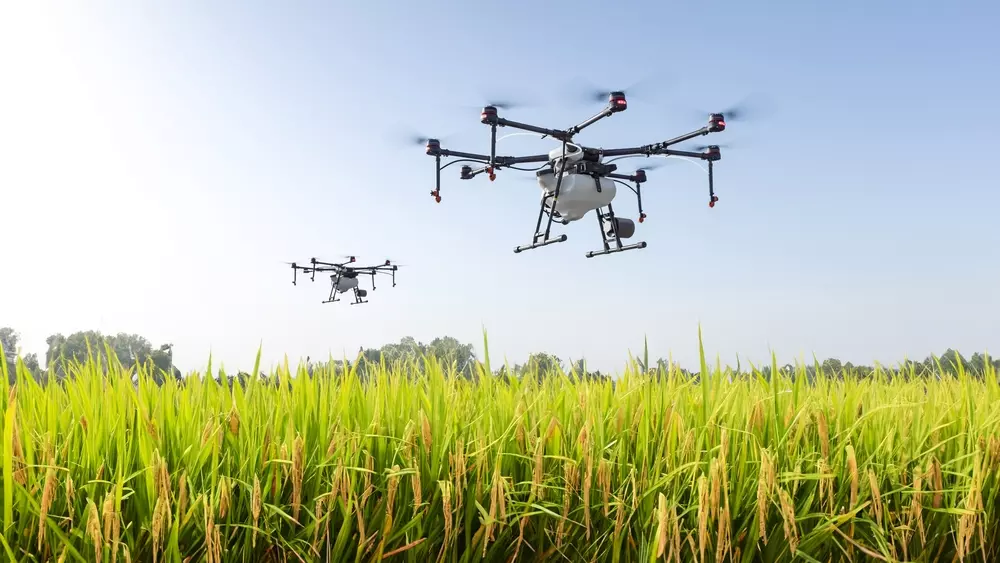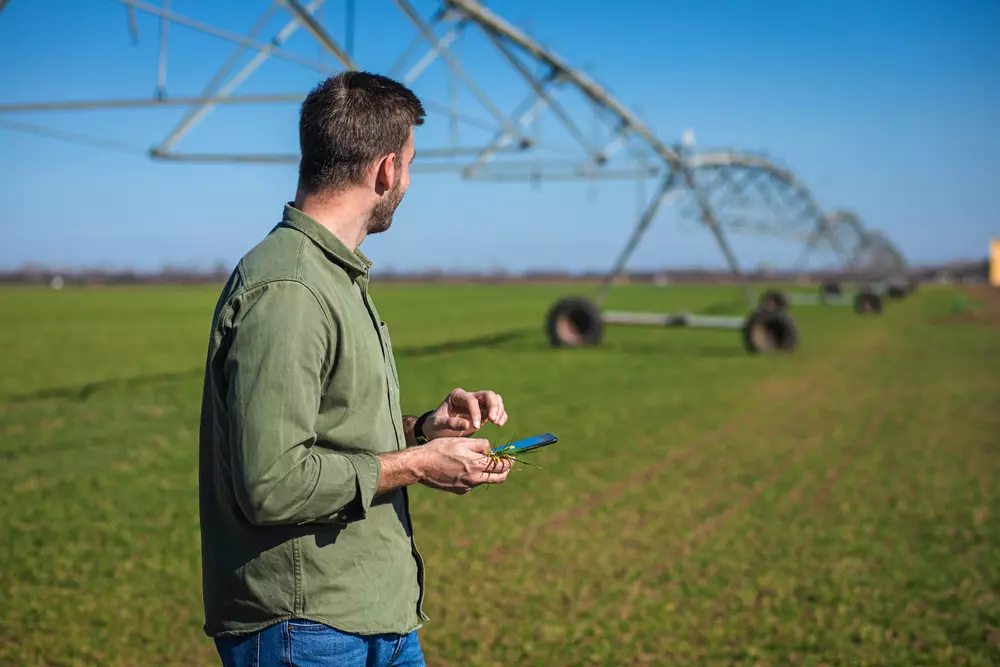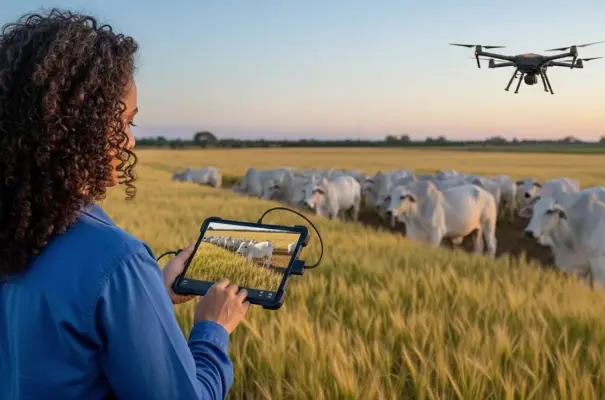Innovation in the countryside has been one of the biggest drivers of transformation in the agricultural sector, with the rural producer as the protagonist of this journey. Between industry and the final customer, they are positioned between technological innovation and the traditions of the land, but increasingly, they also act as articulators of sustainable practices that balance productivity and environmental conservation.
This process also attracts new generations, who are born already connected to topics such as animal welfare, emissions reduction, and responsible pasture management, reinforcing the producer’s role as an agent of transition to low-carbon livestock farming. In this way, the profile of entrepreneurs is being renewed and, at the same time, further fostering the process of technological innovation.
But technology alone is not enough. The new agribusiness managers go far beyond techniques for increasing productivity, expanding their scope based on governance, market vision, financial planning, and actions around legal security. Sustainability has also become part of this agenda, whether through the recovery of degraded areas, the crop-livestock-forest integration (ILPF), or the use of bio-inputs and regenerative soil management. With this new profile, the rural producer leads sustainability initiatives in the countryside and safely supplies domestic and international food markets.
The use of bio-inputs and sustainable fertilizers, for example, has been gaining prominence, as producers seek more ecological alternatives that comply with environmental legislation.
Precision agriculture, the use of drones for crop mapping, soil sensors, satellite monitoring, integrated management software, and artificial intelligence applied to climate and animal welfare are also part of the daily lives of those who produce. These technological solutions, when combined with sustainable management practices, allow for reduced emissions, improved feed efficiency, and the preservation of soil and water—pillars of modern livestock farming.
“These tools not only increase productivity but also reduce costs, enable traceability, and directly connect the field to the demands of international markets. It is precisely this technological transformation that has attracted young professionals to agriculture, as it offers space to apply science and data on a large scale,” assesses Amanda Salis Guazzelli, an agribusiness specialist and founder of Governança Agro, in an interview with Correio Braziliense.
From Entrepreneur to Manager: Far Beyond Technical Qualification
For Ronald Caselli, administrator and CEO of Exponencial Administração e Tecnologia—a company offering solutions in management, technology, compliance, and training—the prominence of Brazilian agribusiness is a direct result of the “combination of technology and management.” Also in an interview with Correio Braziliense, he states that, on one hand, technology has brought mechanization, software, and data intelligence, which have increased field productivity; on the other hand, strategic administration has allowed production to be transformed into sustainable, organized, and often globally competitive businesses. “Brazil has become a world reference because the rural producer has ceased to be just a technician and has also become a manager, using technology as an ally to innovate, reduce costs, and open new markets. This marriage between the field, administration, and technology explains the prominent role of agribusiness in the national economy and its competitiveness in the international market,” Caselli detailed.
However, although agribusiness is often associated with large mechanized properties, the sector is predominantly composed of small and medium-sized producers. Approximately 77% of establishments are family farms, according to the Agricultural Census conducted by IBGE in 2017 (the latest available).
It is precisely among these small and medium-sized producers that sustainable innovation has shown the greatest transformative potential, through the adoption of low-cost, high-positive-environmental-impact practices.
Resources Help Drive Innovation

It is in this scenario, marked by the greater presence of small and medium-sized producers, that credit lines play a strategic role.
Through FIAGROs (Investment Funds in Agricultural Production Chains), created in 2021, for example, Brazil has accelerated the adoption of new technologies in the field, such as smart irrigation systems, precision agriculture, and the use of big data and drones.
As a strategy to attract private resources and boost the modernization of Brazilian agribusiness, these funds allow investors to participate in agribusiness-related assets, such as agricultural land, infrastructure, and production-oriented technologies, offering a structured and secure alternative for those who wish to invest in the sector. Their relevance has increased as Brazil has needed to adapt to an increasingly competitive global market, seeking to enhance the efficiency and sustainability of rural production.
According to the Securities and Exchange Commission (CVM), the FIAGRO industry grew by 204% from March 2023 to March 2025, with net assets jumping from R$ 14.7 billion to R$ 44.7 billion. In 2024, net fundraising was R$ 1.1 billion.
The expansion of these funds has contributed not only to increased productivity but also to consolidating the rural producer as an agent of sustainability, capable of balancing economic results and environmental conservation.
For the most part, investments have been directed towards rural properties, logistics infrastructure, and agricultural technologies, with an emphasis on process modernization and the adoption of new technologies, such as precision agriculture and efficient irrigation. This injection of resources has been fundamental for the expansion and competitiveness of Brazilian agribusiness, particularly concerning sustainability and increased productivity.
The growth of these funds has been supported by tax exemption on income for individuals, which has attracted investors both from Brazil and abroad, seeking profitable and low-risk alternatives in the context of the agricultural economy.
Technology for greater resilience

In the face of global challenges posed by climate change, the use of innovation in the countryside has also been strategic for increasing the sector’s resilience, mitigating risks, and minimizing impacts. One example was the historic drought that affected crops and pastures in several regions of Brazil in 2024. However, even with the impact, the sector’s GDP grew by 1.81%, contrary to the expected drop of 3%, according to data from the Confederation of Agriculture and Livestock of Brazil (CNA). In the first half of 2025, growth was already 6.49%, exceeding expectations and consolidating the sector as one of the main drivers of the Brazilian economy.
The development of more climate-resilient crops, such as drought-tolerant soybean and corn varieties, is a trend. Investments in smart irrigation for operations are another example of how rural producers are incorporating innovation to minimize climate impacts.
This performance reinforces that sustainability and resilience go hand in hand: practices such as crop-livestock-forest integration, rational water use, renewable energy, and genetic selection are the result of the strategic vision of producers who understand their role not only as suppliers but as protagonists of the agro-environmental transition.
Reference sources:
- Blockchain, satélites e IA: a origem da carne no radar
- Censo Agropecuário
- Protagonismo jovem ganha força no agro e transforma o campo
- Emissões de Fiagros em dezembro têm maior volume mensal em quase dois anos
- FIAGRO e CRA impulsionam agronegócio no mercado de capitais nos últimos dois anos
- ILPF é estratégia para reduzir emissões na agropecuária e ampliar acesso ao mercado de carbono
- PIB do agronegócio fecha 2024 com crescimento de 1,81%
- Sustentabilidade que vem de berço




